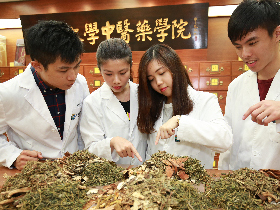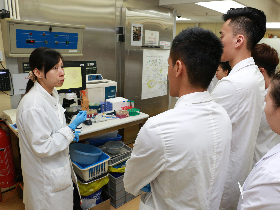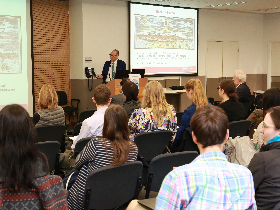Professoriate Staff

School of Chinese Medicine, The University of Hong Kong
- (852) 3917 6476
- (852) 2872 5476
- yfeng@hku.hk
Cantonese, Mandarin, English and Japanese
Chinese, English and Japanese
Chinese Materia Medica, Pharmacology and toxicology of Chinese medicines; Cancer, metabolic diseases, liver and kidney diseases; Chinese Medicine education
BMed, MMed, PhD
- Member of the Chinese Medicine Council of Hong Kong;
- Member of Chinese Medicines in Hospital Authority of Hong Kong;
- Panel-member of Chinese Medicine (Pharmaceutical) Committee in Hospital Authority of Hong Kong;
- Panel-member of Use of Proprietary Chinese Medicine Steering Committee in Hospital Authority of Hong Kong;
- Panel-member of Chinese medicine experts for registration of proprietary Chinese medicines in the Chinese Medicine Council of Hong Kong;
- Organizing Committee member for International Conference & Exhibition of the Modernization of Chinese Medicine & Health Products (ICMCM) (Annual Conference, 2005-present);
- Joint-Chairman for International Conference & Exhibition of the Modernization of Chinese Medicine & Health Products (ICMCM) (2013, 2018, 2019, Hong Kong);
- Convenor of academic advisory board (2007) and organizing committee for HK-Macao postgraduate Symposium on Chinese Medicine (Annual Symposium2005-present, Hong Kong)
- Executive Chairman for The third international symposium and the third national annual conference on dietotherapy and Chinese medicated diet (2012, Hong Kong)
- External reviewer for Bachelor of Science (Hons) Chinese Medicine Program at International Medical University, Malaysia (2012-present)
- WHO observer for Regional Launching and Workshop on Implementing the Regional Strategy for Traditional Medicine in the Western Pacific (2011-2020), 7-8 May 2012, Hong Kong SAR, China
- WHO Expert for The second WHO consultation on quality control of herbal medicines Hong Kong SAR, China, 17-19 November 2014; 4-6 September 2017
- Organizing committee member for Traditional & Alternative Medicine 2016, Amsterdam, Netherlands, September 14-16, 2016
- Organizing committee Chairman for Pong Ding Yueng International Symposium on Chinese Medicine, Hong Kong, 1-3 December 2017
- Standing member of Hong Kong Registered Chinese Medicine Practitioner Association.
- Editors and reviewers for over seventy international journals in Chinese medicine, integrated medicine, complementary and alternative medicine, as well as biomedicine etc.
| Feb 2021- Present | Director, Professor, Supervisor of PhD Candidates and Post-Doctorate Fellows, School of Chinese Medicine, The University of Hong Kong, Hong Kong; and Hong Kong Registered Chinese Medicine Practitioner; Master of Chinese Medicine Programme Stream Co-ordinator (Oncology), School of Chinese Medicine, The University of Hong Kong |
| Sep 2020 – Feb 2021 | Acting Director, Professor, Supervisor of PhD Candidates and Post-Doctorate Fellows, School of Chinese Medicine, The University of Hong Kong, Hong Kong; and Hong Kong Registered Chinese Medicine Practitioner; Master of Chinese Medicine Programme Stream Co-ordinator (Oncology), School of Chinese Medicine, The University of Hong Kong |
| Feb 2020 – Sep 2020 | Acting Director, Associate Professor, Supervisor of PhD Candidates and Post-Doctorate Fellows, School of Chinese Medicine, The University of Hong Kong, Hong Kong; and Hong Kong Registered Chinese Medicine Practitioner; Master of Chinese Medicine Programme Stream Co-ordinator (Oncology), School of Chinese Medicine, The University of Hong Kong |
| Oct 2017 - Nov 2017 | Served as Visiting scientist supported by HKU oversea scholarship in Department of Pharmacology, Yale University School of Medicine, USA |
| 2014 - 2020 | Associate Professor, Associate Director (Education), School of Chinese Medicine, The University of Hong Kong, Hong Kong; and Hong Kong Registered Chinese Medicine Practitioner |
| 2011 - 2014 | Associate Professor, Assistant Director (Education), School of Chinese Medicine, The University of Hong Kong, Hong Kong; and Hong Kong Registered Chinese Medicine Practitioner |
| 2010 - 2011 | Assistant Professor, Assistant Director (Education), School of Chinese Medicine, The University of Hong Kong, Hong Kong; and Hong Kong Registered Chinese Medicine Practitioner |
| 2004 - 2009 | Assistant Professor, Bachelor of Chinese Medicine (BChinMed in full- time) Programme Co-Ordinator, School of Chinese Medicine, The University of Hong Kong, Hong Kong; and Hong Kong Registered Chinese Medicine Practitioner |
| 2002 - 2004 | Chinese Medicine Assistant Professor, School of Chinese Medicine, The University of Hong Kong, Hong Kong; and Limited Registered Chinese Medicine Practitioner in Hong Kong |
| 2000 - 2002 | CM Assistant Professor, Division of Chinese Medicine, SPACE, The University of Hong Kong, Hong Kong; and Limited Registered Chinese Medicine Practitioner in Hong Kong. |
| 1997 - 1999 | Post-Doctoral research fellow, Department of Laboratory Technology and Department of Medicine II, Hokkaido University School of Medicine, Japan |
| 1991 - 1993 | Visiting Scientist, Department of Pharmacology, Faculty of Pharmacy, Meijio University, Japan |
| 1987 - 1991 | Lecturer, Department of Chinese Materia Medica, Yunnan University of Traditional Chinese Medicine, China |
| 1983 - 1985 | Physician, Departments of Infection, and Chinese Medicine, Dehong People’s Hospital, Yunnan, China |
Dr Yibin Feng is currently the Professor (since September2020), Acting Director (Since February 2020) and Director (Since February 2021) in School of Chinese Medicine, the University of Hong Kong. Dr. Feng awarded Bachelor degree in Chinese Medicine from Yunnan University of Chinese medicine in China. He awarded his PhD degree in molecular medicine from Hokkaido University School of Medicine in Japan. He finished postdoctoral research in molecular pharmacology, Hokkaido University in 1999. In his early carrier years, Dr. Feng got various scholarships and research funds from Chinese Government, Japanese Government, Sumitomo social welfare consortium, FUJISAWA Pharmaceutical Limited Incorporation and TSUMURA KAMPO Pharmaceutical Limited Incorporation etc. His major research areas and research topics are Standardization and quality control of Chinese Medicines, Pharmacological screening and safety evaluation of Chinese Medicines; and Pharmacological action and its mechanism of Chinese Medicines as well Chinese medicine education. Recent years, as a PhD supervisor and principal investigator, his research was supported by grants from the Hong Kong Government (RGC, ITF, HMRF,HKCMDF), donations (such as Pong Ding Yueng Endowment Fund for Education & Research in Chinese-Western Medicine, Wong’s Donation for molecular cancer research in Chinese medicines, the Gaia Family Trust, Hong Kong Government-Matching funding), Hong Kong Hospital Authority’s funding for Chinese Medicine, and various industry contract research funding etc. As PI, awarded various grants over 25 million HK$ from 2004-2021. As Co-I,awarded over 23 million HK$ from 2004-2021.
Being an expert in the study of Chinese Materia Medica, Pharmacology and Toxicology of Chinese medicines, Dr. Feng’s research is focused on clinical study and experimental study for cancer and metabolic diseases by using recently developed techniques in OMICS, pharmacology, immunology and Evidence-based Medicine. He also commits to do substitute research for some endangered species used in Chinese Medicine and Chinese medicine education. He has published over 500 publications in English (over 170 SCI papers), Japanese and Chinese in his research areas. All these publications can be categorized to be top 5-10 journals and quality one journals in his research field of Chinese medicine and related fields. His research outputs have great impact on academic field, for example, For example, three of his papers, published in Autophage (namely Guidelines for the use and interpretation of assays for monitoring autophagy (3rd edition)), International Journal of Molecular Sciences (IJMS, namely The Role of Oxidative Stress and Antioxidants in Liver Diseases), and Journal of Ethnopharmacology (JEP, namely Berberine and Coptidis Rhizoma as Novel Antineoplastic Agents: A Review of Traditional Use and Biomedical Investigations) were so far cited 6876, 739 and 478 respectively, as marked by Google scholar, open a new hot topic on coptis in the world and make his research always stand on top level in this field of international arena. His research on coptis and bear bile also got great attention in academia and society, for example, various media in Hong Kong, Mainland China, Taiwan and Oversea in 2008 have reported this research, and at an international conference in London in August 2010, he was invited by BBC studio for interview, he was reported by HKU bulletin as cover story in June 2013 about his research story in bear bile and one of his paper published in Journal of Ethnobiology and Ethnomedicine (Bear bile: dilemma of traditional medicinal use and animal protection) in 2009 was identified as highly accessed paper over 38000 accesses by March, 2020 on the journal website, etc.. In addition to publish papers in my research area in journals of Chinese medicine and integrative medicine, I also published high impact factor papers on Chinese herbal medicine in other reputable journals (Q1 journals in related categories), such as Biochimica et Biophysica Acta (BBA) - Molecular Basis of Disease (IF5.089), BBA-Molecular Cell Research (IF 5.297), BBA- Gene Regulatory Mechanisms (IF5.440), Cellular Physiology and Biochemistry (5.50), Cancers (IF6.162), Cell death & Disease (IF6.304), British Journal of Pharmacology (IF7.730), Cancer Letters (IF7.360), Theranostics (IF 8.85), Signal Transduction and Targeted Therapy (IF 13.446), Hepatology (IF 14.679), Molecular Cancer (IF15.320), Science Advances (IF13.116) etc. He has been listed as one of HKU scientists in the world’s Top 1% by Clarivate Analytics (previously Thomason Reuters, Essential Science Indicators) in the past 6 years. He was as lead guest editor for special issues of liver diseases and Cancer for academic journals in 2011, 2016, 2020, 2021 and 2022 such as Chinese Medicine, Evidence-Based Complementary and Alternative medicine, Frontiers in Pharmacology or in Oncology etc.
He has taught subjects such as Chinese Materia Medica, Pharmacology of Chinese Medicines, Toxicology of Chinese Medicines, Chinese Internal Medicine and Pharmacology. Recently, he is responsible for teaching Chinese Materia Medica, Pharmacology and toxicology of Chinese medicines, Oncology of Chinese Medicines and research methodology in Chinese medicine.
Cancer, diabetes, obesity, liver diseases and renal diseases etc.
Highly active in international communities of Chinese Medicine, Ethnopharmacology, complementary and alternative medicine as well as life science, serving as editors or reviewers for the following international journals:
Editorial Board Members (over ten journals): (1) Evidence-Based Complementary and Alternative Medicine (eCAM) (2) Integrative Cancer Therapy (3) Chinese Medicine (5) Journal of Bioequivalence & Bioavailability (6) ISRN Hepatology (7) Open Journal of Apoptosis (8) UC Alternative Medicine (9) International Journal of Cancer & Diagnosis (IJCRD) (10) Current Analysis in Oncology (11) BMC Complementary Medicine and Therapies, etc. 1 Guest editor and 2 Guest Associate Editor for Frontiers in Oncology and Frontiers in Pharmacology in 2020, 2021 and 2022.
Reviewers (over sixty journals): Evidence-Based Complementary and Alternative Medicine (IF 2.064), Chinese Journal of Integrative Medicine (IF 1.059), Journal of Alternative and Complementary Medicine (IF1.864), Molecular and Cellular Biochemistry (IF3.659), BMC Complementary Medicine and Therapies (IF 2.833), Molecules (IF 3.267), Journal of Agricultural and Food Chemistry (IF3.412), Planta Medica (IF 2.339), Free Radical Research (IF3.188), International Journal of Molecular Sciences (IF4.556), Phytomedicine (IF4.268), Journal of Ethnopharmacology (IF4.36), American Journal of Chinese Medicine (3.682), Bioorganic & Medicinal Chemistry (IF3.07), Frontiers in Pharmacology (IF4.225), Journal of Ginseng Research (IF 5.487), Oxidative Medicine and Cellular Longevity (IF 5.103), Molecular Oncology (IF 6.574), Clinical and Translational Medicine (IF7.919), Expert Opinion on Therapeutic Targets (IF5.139), BBA-Molecular Cell Research (IF 5.538), Free Radical Biology and Medicine (6.170), Cancers (IF6.162), Clinical and Translational Medicine (IF7.919), Gut Microbes (IF8.640), Theranostics (IF8.85), Advanced Science (15.804), Signal Transduction and Targeted Therapy (IF 18.187/ 21.177), Molecular Cancer (IF 27.401/ 20.26) etc..
SELECTED PUBLICATIONS (*CORRESPONDING AUTHOR)
- Zhong Z, Vong CT, Chen F, Tan HY, Zhang C, Wang N, Cui L, Wang Y*, Feng Y*. The immunomodulatory potential of natural products from herbal medicine as immune checkpoints inhibitors: helping to fight against cancer via multiple-targets. Med Res Rev. 2022;1–34. (IF 12.944/ 12.197)
- Lu Y, Chan YT, Tan HT, Zhang C, Guo W, Xu Y, Sharma R, Chen Z, Zheng Y, Wang N*, Feng Y*. Epigenetic regulation of ferroptosis via ETS1/miR-23a-3p/ACSL4 axis mediates sorafenib resistance in human hepatocellular carcinoma. J Exp Clin Cancer Res. 2022, 41:3. (IF 11.161/ 9.976)
- Wang N, Wang L, Zhang C, Tan HY, Zhang Y, Feng Y*. Berberine suppresses advanced glycation end products-associated diabetic retinopathy in hyperglycemic mice. Clin Transl Med. 2021 Nov;11(11):e569. (IF 11.492/ 8.601)
- Tang G, Li S, Zhang C, Chen H, Wang N, Feng Y*. Clinical efficacies, underlying mechanisms and molecular targets of Chinese medicines for diabetic nephropathy treatment and management. Acta Pharm Sin B. 2021 Sep;11(9):2749-2767. (IF 11.614/ 9.894)
- Cheng CS, Tan HY, Wang N, Chen L, Meng Z, Chen Z*, Feng Y*. Functional Inhibition of Lactate Dehydrogenase Suppresses Pancreatic Adenocarcinoma Progression. Clin Transl Med. 2021 Jun; 11 (6): e467. (IF 11.492/ 8.601)
- Tan HY, Wang N, Zhang C, Chan YT, Yuen MF, Feng Y*. LOXL4 Fosters an Immunosuppressive Microenvironment During Hepatocarcinogenesis. Hepatology. 2021 May. 2021 Jun; 73 (6): 2326-2341. (IF 17.425/ 16.555)
- Li S, Cheng CS, Zhang C, Tang G, Tan HY, Chen H, Wang N, Lai AYK, Feng Y*. Edible and Herbal Plants for the Prevention and Management of COVID-19. Frontiers in Pharmacology, 28 April 2021 https://doi.org/10.3389/fphar.2021.656103.
- Wang N, Tan HY, Lu Y, Chan YT, Wang D, Guo W, Xu Y, Zhang C, Chen F, Tang G, Feng Y*. PIWIL1 Governs the Crosstalk of Cancer Cell Metabolism and Immunosuppressive Microenvironment in Hepatocellular Carcinoma. Signal Transduct Target Ther. 2021 Feb; 6 (1): 86. (IF 18.187/ 21.177)
- Chen F, Zhong Z, Tan HY, Guo W, Zhang C, Cheng CS, Wang N, Ren J*, Feng Y*. Suppression of lncRNA MALAT1 by Betulinic Acid Inhibits Hepatocellular Carcinoma Progression by Targeting IAPs via miR-22-3p. Clin Transl Med. 2020 Oct; 10 (6): e190. (IF 11.492/ 8.601)
- Xu Y, Wang N, Tan HY, Li S, Zhang C, Zhang Z, Feng Y *. Panax notoginseng Saponins Modulate the Gut Microbiota to Promote Thermogenesis and Beige Adipocyte Reconstruction via Leptin-Mediated AMPKα/STAT3 Signaling in Diet-Induced Obesity. Theranostics. 2020 Sep; 10 (24): 11302-11323. (IF 11.556/ 11.629)
- Li S, Wang N, Tan HY, Chueng F, Zhang ZJ, Yuen MF, Feng Y*. Modulation of Gut Microbiota Mediates Berberine-Induced Expansion of Immuno-Suppressive Cells to against Alcoholic Liver Disease. Clin Transl Med. 2020 Aug; 10 (4): e112. (IF 11.492/ 8.601)
- Lu Y, Chan YT, Tan HY, Li S, Wang N*, Feng Y*. Epigenetic Regulation in Human Cancer: The Potential Role of Epi-Drug in Cancer Therapy. Mol Cancer. 2020 Apr; 19 (1): 79. (IF 27.401/ 20.26)
- Zhang C, Wang N, Tan H, Guo W, Chen F, Zhong Z, Man K, Tsao S, Lao L, Feng Y*. Direct inhibition of TLR4/MyD88 pathway by geniposide suppresses HIF1α-independent VEGF expression and hepatocellular carcinoma angiogenesis. British Journal of Pharmacology 2020 Mar 6. doi: 10.1111/bph.15046. [Epub ahead of print]. (IF 8.739/7.548).
- Wang N, Tan HY, Li S, Wang D, Xu Y, Zhang C, Xia W, Che CM, Feng Y*. SBP2 Deficiency in Adipose Tissue Macrophages Drives Insulin Resistance in Obesity. Sci Adv. 2019 Aug; 5 (8): eaav0198. (IF 14.136/ 16.446)
- Qu Y, Dou B, Tan HY, Feng Y*, Wang N*, Wang D*. Tumor microenvironment-driven non-cell-autonomous resistance to antineoplastic treatment. Molecular Cancer 2019 Mar 30; 18(1):69. (IF 27.401/ 20.26).
- Tan HY, Wang N, Lam W, Guo W, Feng Y*, Cheng YC*. Targeting Tumour Microenvironment by Tyrosine Kinase Inhibitor. Mol Cancer. 2018 Feb; 17 (1): 43. (IF 27.401/ 20.26)
- Wang N, Tan H, Li S, Feng Y*. Atg9b Deficiency Suppresses Autophagy and Potentiates Endoplasmic Reticulum Stress-Associated Hepatocyte Apoptosis in Hepatocarcinogenesis. Theranostics. 2017 Jun; 7 (8): 2325-2338. (IF 11.556/ 11.629)
- Klionsky DJ*,…Feng Y, …et al. Guidelines for the use and interpretation of assays for monitoring autophagy (3rd edition). Autophagy. 2016 Jan 2; 12(1):1-222. (IF 11.100, and the 5-Year IF is 11.815).
- Li S, Hong M, Tan HY, Wang N, Feng Y*. Insights into the role and interdependence of oxidative stress and inflammation in liver diseases. Oxidative medicine and cellular longevity 2016, 2016:4234061. doi: 10.1155/2016/4234061. (IF 5.076, 5-year IF 4.392).
- Tan HY, Wang N, Man K, Tsao SW, Che CM, Feng Y*. Autophagy-induced RelB/p52 activation mediates tumor associated macrophage repolarisation and suppression of hepatocellular carcinoma by natural compound baicalin. Cell Death and Disease (2015) 6, e; doi:10.1038/cddis.2015.271 (Nature group, IF 8.469/ 8.713).
- Li S, Tan HY, Wang N, Zhang ZJ, Lao L, Wong CW, Feng Y*. The role of oxidative stress and antioxidants in liver diseases. International journal of molecular sciences 2015, 16 (11), 26087-26124 (IF 4.181, 5-Year IF 4.331)
- Hong M, Wang N, Tan HY, Tsao SW, Feng Y*. MicroRNAs and Chinese medicinal herbs: new possibility in cancer therapy. Cancers 2015, 7 (3):1643-1657. (IF 6.162).
- Wang N, Zhu M, Tsao SW, Man K, Zhang Z, Feng Y*. MiR-23a-Mediated Inhibition of Topoisomerase 1 Expression Potentiates Cell Response to Etoposide in Human Hepatocellular Carcinoma. Mol Cancer. 2013 Oct; 12 (1): 119. (IF 27.401/ 20.26)
- Wang N, Pan W, Zhu M, Zhanf M, Hao X, Liang G, Feng Y*. Fangchinoline induces autophagic cell death via p53/sestrin2/AMPK signaling in human hepatocellular carcinoma cells. British Journal of Pharmacology 2011;164(2b):731-742. (IF8.739/7.548).
- Feng Y*, Wang N, Ye X, Li H, Feng Y, Cheung F, Nagamatsu T. Hepatoprotective effect and its possible mechanism of Coptidis rhizoma aqueous extract on carbon tetrachloride-induced chronic liver hepatotoxicity in rats. Journal of Ethnopharmacology 2011,138: 683-90. (IF 4.36/4.347).
- Wang N, Feng Y*, Zhu M, Tsang CM, Man K, Tong Y, Tsao SW. Berberine induces autophagic cell death and mitochondrial apoptosis in liver cancer cells: the cellular mechanism. Journal of cellular biochemistry 2010, 111(6):1426-36. (IF 3.448, 5-year IF 3.342)
- Feng Y*, Siu KY, Ye X, Wang N, Yuen MF, Leung CH, Tong Y, Kobayashi S. Hepatoprotective effects of berberine on carbon tetrachloride- induced acute liver hepatotoxicity in rats. Chinese Medicine 2010, 5:33 (1-6. (IF5.455/4.422).
- Ye XS, Feng Y*, Tong Y, Ng KM, Tsao SW, Lau George KK, Sze CW, Zhang YB, Tang J, Shen JG, Kobayashi S. Hepatoprotective effects of Coptidis Rhizoma aqueous extract on carbon tetrachloride-induced acute liver hepatotoxicity in rats. Journal of Ethnopharmacology 2009, 124:130–136.
- Tang J, Feng Y*, Tsao S, Wang N, Curtain R, Wang Y. Berberine and Coptidis Rhizoma as novel antineoplastic agents: A review of traditional use and biomedical investigations. Journal of Ethnopharmacology 2009, 126:5-17. (IF 3.690, 5-year IF 3.671)
- Hong M, Li S, Tan HY, Wang N, Tsao SW, Feng Y*. Current status of herbal medicines in chronic liver disease therapy: the biological effects, molecular targets and future prospects. International journal of molecular sciences 16 (12), 28705-28745. (IF 4.556, 5-Year IF 4.331).
- Feng Y*, Siu K, Wang N, Ng KM, Tsao SW, Nagamatsu T, Tong Y. Bear bile: dilemma of traditional medicinal use and animal protection. Journal of Ethnobiology and Ethnomedicine 2009, 5 (1), 2. (IF 2.273, 5-year IF 3.06).
- 程健珊,吳瑋,陳建萍,羅翌,蔡輝穎,石軍,榮建輝,張樟進,沈劍剛,馮奕斌*. 中醫藥防治新型冠狀病毒感染的肺炎(COVID-19)的進展及展望. 香港中醫雜誌 2020, 15(2):11-19.
- 杜永達, 馮奕斌*. 代謝綜合症中醫治療及病案分析一例. 香港中醫雜誌. 2015, 10(2):54-58.
- 馮奕斌,黎磊, 勞力行.香港大學中醫藥學院的創立和發展. 中醫教育. 2015, 34(6):66-69. 北京.
- 王蕾蕾,王甯,馮奕斌*,張殷建*.中藥治療糖尿病視網膜病變臨床與基礎研究進展.中國中醫眼科雜誌 ,2014,24(3):227-232.
- 林蓓茵,馮奕斌*. 糖尿病合併結直腸癌關係探討及中藥免煎顆粒治療驗案一例. 香港中醫雜誌. 2014, 9(1):31-36.
- 馮奕斌,黎磊, 勞力行. 香港中醫藥高等教育的回顧與展望. 中醫教育. 2014, 33(4):1-4. 北京.
- 陳雷,張凡,馮奕斌*. 中醫藥防治原發性肝癌的臨床研究進展. 香港中醫雜誌 2013, 8(2):80-86.
- 林蓓茵,馮奕斌*. 糖尿病合併膽管癌關係探討及病案分析一例. 香港中醫雜誌 2013, 8(1):26-29.
- 林小珊,馮奕斌*. 香砂六君湯合葛根芩連湯治療大腸癌經驗探析.香港中醫雜誌 2011, 6(3):35-38.
- 林小珊,馮奕斌*. 清熱類中藥抗腫瘤的作用特點及作用機制研究進展.香港中醫雜誌 2009, 4(1):97-105.
- 馮奕斌*, 童瑤. 從中藥現代研究看中醫學的基本特點. 香港中醫雜誌, 2008; 3 (1): 17-21. 香港.
- 馮奕斌*,羅偉權,朱世清. 從黃連及其複方古今臨床應用,發掘現代臨床新應用. 中國中藥雜誌 2008, 33(10):1221-1225. 北京.
- 馮奕斌*,葉星沈,童瑤. 建立香港中藥不良反應監測系統和發揮中醫藥在香港藥物濫用防治中的作用. 中國藥物濫用防治雜誌 2007; 13(4):220-223. 北京.
- 馮奕斌*,陳抗生. 國內外資料庫中對中藥不良反應和中毒的基本情況及述評.香港中醫雜誌2007; 2(1):27-33. 香港.
- 馮奕斌*, 童瑤, 劉蘋迴.中藥複方研究之探討.香港中醫雜誌,2006;1(2): 64-67. 香港.
- 馮奕斌, 童瑤, 湯俊,朱世清.試論香港的中藥標準化, 上海中醫藥雜誌2005; 39(10):3-4. 上海.
- 馮奕斌*. 中藥學的教學構思和實踐. 中國中醫藥現代遠程教育2004; 2 (8):38-40. 北京.
- 馮奕斌*.中藥現代化研究及其展望. 亞太生技2004;2(1):48-52. 新加坡.
- 羅偉權, 馮奕斌. 腸瘤消對大腸腺瘤及其癌變患者術後鞏固治療的臨床觀察. 中醫雜誌2004;45:78-79. 北京.
- 馮奕斌. 解表祛邪治狐惑. 成都中醫學院學報1991;14(1):19-20.成都.
- 馮奕斌. 中藥的現代臨床研究. 雲南中醫學院學報,1987;10(4): 7-10.昆明.
SELECTED BOOKS AND CHAPTERS IN BOOKS (* CORRESPONDING AUTHOR)
- Xu HX, Zhu GF, Feng Y, Editor-in-Chief. Anticancer Chinese Medicines: Origen, chemistry, pharmacology and clinical application. Shanghai: Science Publisher. 2018, ISBN 978-7-5478-4080-1/R 1657, pp884. (In Chinese).
- Chen Chang-xun (Editor in Chief). Editorial board: Cao HY, Chen LY, Chen YF, Fang XY, Feng Y, Gu WL, Gu Y, Hua YQ, Huang LL, Nie Hong, Qu F, Shen YH, Solos L, Wang B, Wang J, Wang N, Wang XB, Wang YY, Xu HB, Yu S, Zhang JX. Pharmacology of Chinese Materia Medica. National “Thirteenth Five-Year_Plan” Inovative Textbooks for higher education in Chinese Medicine. China Press of Traditional Chinese Medicine. Beijing. Pp267 (in English).
- Chen Dexing, Wen xiapin (Editor in Chief), Editorial board: Chen BZ, Chen DX, Du GL, Fan Y, Feng Y, Hu FL, Hua HM, Jia P, Ni C, Nian L, Ruan SB, Wang F, Wang JN, Wen XP, Xin ZP, Xu XD, Yu Y, Yun XL. National Textbook for Chinese Medicine Prescription. Qinghua University Press, 1th edition, 2013. Beijing, China. pp394 (in Chinese).
- Alan Worsley, Feng Y, Wang N, Ho Faith, Yu Edwin, Rose Mak. Use of Herbs in Chinese and Western Medicine. Hong Kong Museum of Medical Sciences Society. 1th edition in Bilingual in Chinese and English, 2013. Hong Kong, China. pp67 (in Bilingual).
- Xie Mengzhou (Editor in Chief). Editorial board: Shang YQ, Yi W, Zhou J, Wu ZZ, Nie H, Shi LP, Tian SL, Feng Y, Sun ZM, Li HT, Zhang B, Lin Y, Jin H, Zhou Y, Zhao XW, Guo T, Liang XW, Xie XJ, Tai X, Sun GX. National Textbook for diet therapy. Zhong Guo Zhong Yi Yao Chu Ban She (China Chinese medicine and Chinese medicines publisher), 2nd edition, 2013. Beijing, China. pp387. (in Chinese)
- Feng YG, Wang N, Chueng F, Zhu M, Li H, Feng Y*. Molecular and Cellular Mechanism Studies on Anticancer Effects of Chinese Medicines. Chapter in Biomedical Engineering, Trends, Research and Technologies (pp332-362). ISBN 978-953-307-514-3. 2011, pp644. (in English).
- Feng Y, Chen XM, Wang N and Shen JG*. Current Progress on Medicinal Plants and their Biological Properties in Contemporary China (Around 20,000 words). Chapter in Recent Progress in Medicinal Plants Vol. 28: Ethnomedicine: Source & Mechanism-II. Studium Press LLC, USA. 2010, pp491-546. (in English).
- Tong Y* and Feng Y. Assessments in the Bachelor of Chinese Medicine (BChinMed) Programme. Chapter in The assessment of the University of Hong Kong. 2009, pp51-58. Published by Institute of Medical and Health Sciences Education, Li Ka Shing Faculty of Medicine, The University of Hong Kong. (in English).
- Feng Y, Editor-in-chief. Editorial board: Liu KJ, Wang J, Shen JG, Zhang YB, Rong JH, Tong Y, Chan KS and Wong Albert B. Basic and Clinical Toxicology of Chinese Medicines (around 460,000 words). Commercial Press (HK) Ltd. 2009. (Chinese).
- Yang GQ, Wu ZB, Zhang DN, Jin JM, Feng Y. A study on the prescriptions in “Herbal medicines in Yunnan”. Published by Science and Technology of Yunnan Press,1993 (ISBN7-5416-0473- 9/R.86).pp.1-319. (in Chinese).








